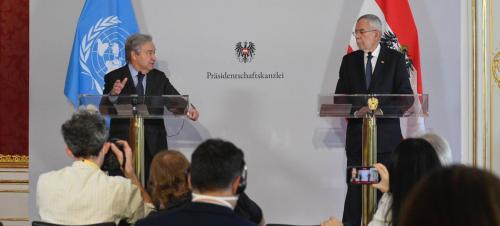Dialogue and cooperation needed for ‘interlinked global crises’ UN chief says in Austria
The world is facing “multiple and interlinked global crises,” the UN chief told journalists in Austria on Wednesday during a joint press conference with Chancellor Karl Nehammer and Foreign Minister Alexander Schallenberg.

Secretary-General António Guterres (left) and the President of Austria, Alexander Van der Bellen, hold a joint press conference in Vienna, Austria.
Expressing his “deep gratitude” for the country’s “unwavering commitment to multilateralism,” Secretary-General António Guterres said that support and commitment are “more critical today than ever”.
“In our time – a time of conflicts, climate crisis and COVID-19 – there is simply no sustainable alternative to dialogue, international cooperation, and global solutions,” he said.
Building a better world
Amidst a proliferation of conflicts – including Russia’s invasion of Ukraine, which Mr. Guterres flagged is a violation of its territorial integrity and of the UN Charter – he expressed his particular concern over strikes on urban centres, such as Odesa.
“The war must end for the sake of the people of Ukraine, Russia, and the entire world,” he underscored.
The UN chief advocated for a world that respects international law, protects civilians with a peaceful future on a healthy planet, advances human rights and where leaders live up to the values that they have promised to uphold.
Bolstering support
The UN remains intensely focused on expanding support for Ukrainians, saving lives, reducing suffering, and helping to find a path of peace, according to the top diplomat.
“We will keep pushing for a full-scale ceasefire, effective humanitarian corridors and safe passage for civilians and life-saving supplies, building on what, together with the International Committee of the Red Cross and the parties, we were able to do in Mariupol,” he upheld.
Meanwhile, the UN has mobilized to prevent impacts beyond Ukraine’s borders – including containing the spectre of regional escalation.
Assisting Moldova
The Secretary-General just came from a visit to Moldova, which, despite its incredible support for Ukrainian refugees, faces the interlocking crises of COVID, security, and high inflation caused by skyrocketing prices of food and energy and blocked trade routes, namely Odesa.
“I appeal to the international community, and I take profit of being here, and in particular to the European Union, to provide massive support, including budget support, to help preserve Moldova’s stability and pursue its ambitious reform agenda,” he said.
“We must also work together to protect refugees from human trafficking, gender-based violence, and other forms of abuse”.
African knock-down
Before Moldova, the UN chief travelled to Senegal, Niger and Nigeria, which like developing countries everywhere, are reeling from the cascading challenges of an unabated climate emergency, uneven COVID recovery, and a triple crisis of food, energy and finance, exacerbated by the war in Ukraine.
He expressed his deep concern over “hunger becoming widespread in different parts of the world because of the dramatic food security situation we are facing because of the war in Ukraine.”
Underscoring the importance of Ukraine’s food and Russia and Belarus’s food and fertilizer returning to markets, the top UN official promised to “do everything I can to facilitate the dialogue that can lead to results in this respect”.
Austria: ‘Bridge-builder’
Lauding Austria as a steadfast ally in seeking multilateral solutions, he called the country “a bridge-builder between East and West, and a generous host of many United Nations organizations”.
“I always hear from colleagues working in Vienna that the conditions created by the Austrian authorities are so favourable that many decide to retire and go on living here,” he said, calling that “the best testimony to the fantastic hospitality of our host city and host country”.
Mr. Guterres concluded by saying that he looks forward to deepening the “strong partnership”.
Source:UN
- 315 reads
Human Rights
Ringing FOWPAL’s Peace Bell for the World:Nobel Peace Prize Laureates’ Visions and Actions

Protecting the World’s Cultural Diversity for a Sustainable Future

The Peace Bell Resonates at the 27th Eurasian Economic Summit

Declaration of World Day of the Power of Hope Endorsed by People in 158 Nations

Puppet Show I International Friendship Day 2020

